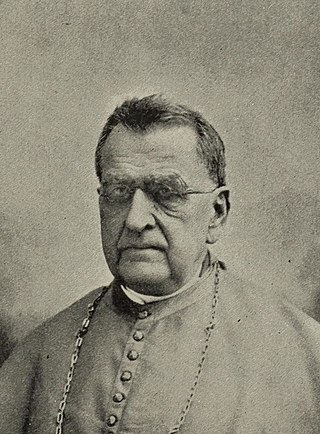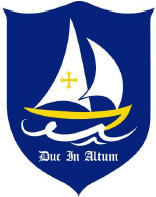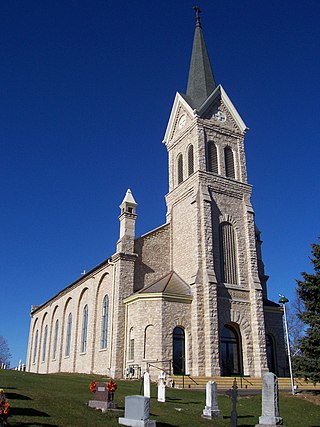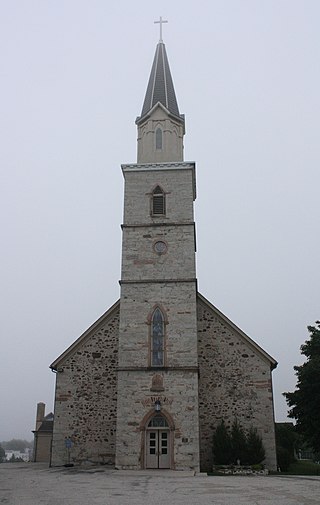
The Archdiocese of Milwaukee is a Latin Church ecclesiastical territory or archdiocese of the Catholic Church headquartered in Milwaukee, Wisconsin in the United States. It encompasses the City of Milwaukee, as well as the counties of Dodge, Fond du Lac, Kenosha, Milwaukee, Ozaukee, Racine, Sheboygan, Walworth, Washington and Waukesha, all located in Wisconsin.

The Diocese of Madison is a Roman Catholic diocese in the southwestern part of Wisconsin in the United States. The diocese has approximately 167,000 Catholics in 102 parishes with 98 priests in active ministry.

Devil's Lake State Park is a state park located in the Baraboo Range in eastern Sauk County, just south of Baraboo, Wisconsin. It is around thirty-five miles northwest of Madison, and is on the western edge of the last ice-sheet deposited during the Wisconsin glaciation. The state park encompasses 9,217 acres (3,730 ha), making it the largest in Wisconsin. The state park is known for its 500-foot-high (150 m) quartzite bluffs along the 360-acre (150 ha) Devil's Lake, which was created by a glacier depositing terminal moraines that plugged the north and south ends of the gap in the bluffs during the last ice age approximately 12,000 years ago. The sand at the bottom of Devil's Lake is thought to be deposited by glaciers.

John Hennessy was a 19th-century Irish-born prelate of the Roman Catholic Church who served as bishop and archbishop in the United States. He served as bishop and then the first archbishop of the Archdiocese of Dubuque, Iowa from 1866–1900.

The Circus World Museum is a museum complex in Baraboo, Wisconsin, devoted to circus-related history. The museum features circus artifacts and exhibits and hosts daily live circus performances throughout the summer. It is owned by the Wisconsin Historical Society and operated by the non-profit Circus World Museum Foundation. The museum was the major participant in the Great Circus Parade held from 1963 to 2009.

Michael Heiss was a German-born prelate of the Roman Catholic Church who served as the first bishop of the Diocese of La Crosse in Wisconsin (1868–1880) and the second archbishop of the Archdiocese of Milwaukee in Wisconsin (1881–1890).

Kilian Caspar Flasch was a German-born prelate of the Roman Catholic Church who served as bishop of the Diocese of La Crosse in Wisconsin from 1881 until his death in 1891.

Mount Saint Michael is a former Seminary, School, Farm and Retreat for the Jesuit order of the Roman Catholic Church in Spokane, Washington. It was later sold to Congregation of Mary Immaculate Queen (CMRI), a Sedevacantist Catholic religious congregation. Sedevacantists are traditionalist Catholics who do not accept the legitimacy of any pope since John XXIII.

Saint Francis de Sales Seminary is a seminary for the Roman Catholic Archdiocese of Milwaukee, located in the Milwaukee suburb of St. Francis, Wisconsin. Its main building, called Henni Hall, is listed on the National Register of Historic Places.
The Sisters of St. Francis of Assisi is a Catholic religious congregation for women founded in 1849. The motherhouse is in St. Francis, Wisconsin, in the Archdiocese of Milwaukee.

Calvary Cemetery is the oldest existing Catholic cemetery in Milwaukee, Wisconsin. Owned by the Archdiocese of Milwaukee, it is the final resting place for many of the city's early influential figures. The cemetery was designated a Milwaukee Landmark in 1981.

Holy Hill Basilica and National Shrine of Mary, Help of Christians is a Roman Catholic shrine in the north central United States, dedicated to the Blessed Virgin Mary. The centerpiece of the shrine is a minor basilica. It is located in the town of Erin, near Hubertus, Wisconsin, in the Roman Catholic Archdiocese of Milwaukee. The shrine has approximately 300,000 visitors per year.

National Park Seminary — later called National Park College — was a private girls' school open from 1894 to 1942. Located in Forest Glen Park, Maryland, its name alludes to nearby Rock Creek Park. The historic campus is to be preserved as the center of a new housing development.

John Martin Henni was a Swiss-born prelate of the Roman Catholic Church who served as the first Archbishop of the Archdiocese of Milwaukee, Wisconsin from 1843 until his death in 1881.

Magdalen College of the Liberal Arts, is a private Catholic liberal arts college in Warner, New Hampshire. It is recognized as a Catholic college by the Diocese of Manchester and recommended by the Cardinal Newman Society. Magdalen College offers associate and bachelor's degrees in liberal studies with majors in philosophy, theology, history, and literature as well as a multi-disciplinary major in the great books. Its curriculum is based on the study of the great books throughout its curriculum both in its core and in its majors. Magdalen College possesses degree-granting authority from the State of New Hampshire and is regionally accredited by the New England Association of Schools and Colleges.

This is a list of the National Register of Historic Places listings in Sauk County, Wisconsin. It is intended to provide a comprehensive listing of entries in the National Register of Historic Places that are located in Sauk County, Wisconsin. The locations of National Register properties for which the latitude and longitude coordinates are included below may be seen in a map.

The St. John the Baptist Roman Catholic Church is a Roman Catholic church in Johnsburg in Fond du Lac County, Wisconsin. The church is part of the Roman Catholic Archdiocese of Milwaukee. It was listed on the National Register of Historic Places in 1980.

St. Gregory Parish, also known as St. Gregory Nazianzen, is a Catholic parish of the Diocese of Green Bay. Its historic parish church, dedicated to Saint Gregory of Nazianzus, is located at 214 Church Street in the village of St. Nazianz, Wisconsin.

St. Charles Seminary is a former American Catholic seminary, founded by the Missionaries of the Precious Blood in 1861 in Carthagena, Ohio. The seminary closed in 1969 and is now a retirement center for clergy and lay people. The seminary, chapel, and five other buildings were added to the National Register of Historic Places in 1979.

Mary Mortimer was a British-born American educator. She served as principal of the Milwaukee Female College and other women's educational institutions.






















